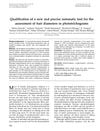 13 citations,
January 2010 in “Advances in Biochemical Engineering / Biotechnology”
13 citations,
January 2010 in “Advances in Biochemical Engineering / Biotechnology” Understanding hair biology is key to developing better treatments for hair and scalp issues.
12 citations,
January 2020 in “Indian Dermatology Online Journal” Female pattern hair loss has multiple causes and treatments, with new therapies showing promise.
 192 citations,
April 2019 in “ACS nano”
192 citations,
April 2019 in “ACS nano” A new microneedle patch made from hair proteins helps regrow hair faster and better than current treatments.
 9 citations,
January 2011 in “Skin Research and Technology”
9 citations,
January 2011 in “Skin Research and Technology” The new automatic tool accurately measures hair thickness and is reliable.
 5 citations,
June 2019 in “JAAD Case Reports”
5 citations,
June 2019 in “JAAD Case Reports” Imiquimod used intravaginally for cervical issues can cause temporary hair loss, especially if severe side effects occur.
 72 citations,
September 1997 in “Dermatologic Surgery”
72 citations,
September 1997 in “Dermatologic Surgery” Careful planning and patient counseling can lead to excellent hair transplant results, often in one or two sessions.
 26 citations,
December 2015 in “Journal of The European Academy of Dermatology and Venereology”
26 citations,
December 2015 in “Journal of The European Academy of Dermatology and Venereology” New method measures female hair loss: Female Pattern Hair Loss Severity Index (FPHL-SI).
 13 citations,
August 1995 in “Australasian Journal of Dermatology”
13 citations,
August 1995 in “Australasian Journal of Dermatology” Hair follicles are smaller in people with androgenetic alopecia compared to those with normal scalps.
 51 citations,
September 2020 in “Cell Metabolism”
51 citations,
September 2020 in “Cell Metabolism” Glutamine metabolism affects hair stem cell maintenance and their ability to change back to stem cells.
 1 citations,
May 2023 in “Frontiers in Pharmacology”
1 citations,
May 2023 in “Frontiers in Pharmacology” Millet seed oil may help hair grow by activating certain cell growth signals.
 12 citations,
February 2001 in “Annals of Pharmacotherapy”
12 citations,
February 2001 in “Annals of Pharmacotherapy” No effective treatment for hair loss after childbirth was found, but it usually gets better on its own and some cosmetic methods might help.
 15 citations,
January 2016 in “Przeglad Menopauzalny”
15 citations,
January 2016 in “Przeglad Menopauzalny” Eating a balanced diet with specific nutrients is important for menopausal women to manage hair loss.
 131 citations,
November 1998 in “The journal of investigative dermatology/Journal of investigative dermatology”
131 citations,
November 1998 in “The journal of investigative dermatology/Journal of investigative dermatology” Skin grafts on mice can cause an immune response leading to hair loss, useful for studying human hair loss conditions.
 1 citations,
January 2001 in “Cosmetics and toiletries”
1 citations,
January 2001 in “Cosmetics and toiletries” Procyanidin B-2 from apple juice significantly increases hair growth and may be more effective than minoxidil without side effects.
 8 citations,
August 2020 in “Domestic Animal Endocrinology”
8 citations,
August 2020 in “Domestic Animal Endocrinology” Melatonin improved cashmere production in goats during the first cycle but had no lasting effects on the next cycle.

PRP injections did not significantly improve hair growth in men with androgenetic alopecia.
 80 citations,
August 2002 in “Journal of Dermatology”
80 citations,
August 2002 in “Journal of Dermatology” Best hair growth results from combining finasteride and minoxidil.
1 citations,
January 2020 in “Indian journal of dermatology, venereology, and leprology” CD117 and platelet-derived growth factor receptor α may play a role in alopecia areata.
 October 2022 in “IntechOpen eBooks”
October 2022 in “IntechOpen eBooks” Hair loss due to scarring can be treated by reducing inflammation, removing scar tissue, and transplanting hair. The Follicular Unit Extraction technique is effective but requires skill and time. Future focus should be on scar-less healing methods.
 August 2024 in “PLoS ONE”
August 2024 in “PLoS ONE” Combining PRP with Minoxidil improves hair density and thickness more than Minoxidil alone.
 1 citations,
May 2017 in “InTech eBooks”
1 citations,
May 2017 in “InTech eBooks” Some natural remedies may help with hair regrowth, but more research is needed to confirm their effectiveness and safety.
 December 2022 in “Frontiers in Pharmacology”
December 2022 in “Frontiers in Pharmacology” Tianma Gouteng decoction may help prevent hair loss and promote hair growth.
 39 citations,
March 2007 in “Journal of Cosmetic Dermatology”
39 citations,
March 2007 in “Journal of Cosmetic Dermatology” Dutasteride helps slow hair loss and boosts hair growth.
May 2021 in “F1000Research” The treatment led to denser, thicker hair growth and less hair loss.
 July 2023 in “Dermatology and Therapy”
July 2023 in “Dermatology and Therapy” 5-Alpha Reductase Inhibitors are effective for male hair loss and some skin conditions, but their effectiveness in women and safety concerns require careful use.
 7 citations,
December 2021 in “Pharmaceutics”
7 citations,
December 2021 in “Pharmaceutics” Natural products like plant extracts can help promote hair growth and could be used to treat hair loss.
 4 citations,
May 2019 in “Skin Research and Technology”
4 citations,
May 2019 in “Skin Research and Technology” Finasteride helps hair growth but stopping it causes faster hair loss.
3 citations,
September 2021 in “EClinicalMedicine” ALRV5XR effectively increases hair density in men with androgenetic alopecia without adverse effects.
 10 citations,
January 2003 in “Seminars in reproductive medicine”
10 citations,
January 2003 in “Seminars in reproductive medicine” The article explains how to identify and treat excessive hair growth in women, which can be distressing and may signal other health problems.

The serum effectively promotes hair growth and reduces gray hair without side effects.


























